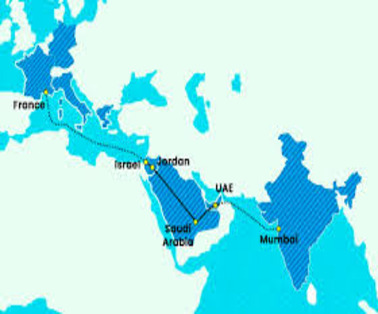As the council chair of the Global Partnership on Artificial Intelligence (GPAI), India will host the Annual GPAI Summit from December 12th to 14th, 2023, marking a significant event for global AI cooperation.
Key Points
- The Summit will witness the involvement of experts in AI representatives from multilateral organizations and other pertinent stakeholders from more than 28 member countries of the GPAI and the European Union.
- The AI Gamechangers Award is being organized by the Ministry of Electronics and Information Technology (MeitY) as a component of the Annual GPAI Summit.
- The AI Gamechangers Award aims to establish an international forum for acknowledging responsible AI solutions advancing AI innovation and supporting the Global Partnership on AI (GPAI) mission by promoting the responsible development and implementation of AI technologies.
Global Partnership on Artificial Intelligence (GPAI)
- The Global Partnership in Artificial Intelligence was launched on June 15, 2020.
- It is a multi-stakeholder initiative that was developed by the G7 alliance.
- Its establishment was announced during the 2018 G7 Summit by Canadian PM Justin Trudeau and French President Emmanuel Macron.
- Its objective is to fill the gap between theory and practice on artificial intelligence by promoting cutting-edge research and related activities.
- This initiative promotes global cooperation on artificial intelligence technology by bringing together experts from fields like science, industry, civil society, governments, international bodies and academia on a single platform.
- Its Secretariat is hosted at the OECD.
Members of the Global Partnership on Artificial Intelligence (GPAI)
- At present, GPAI has twenty-nine member states i.e Australia, Belgium, Brazil, Canada, Czech Republic, Denmark, France, Germany, India, Ireland, Israel, Italy, Japan, Mexico, the Netherlands, New Zealand, Poland, the Republic of Korea (South Korea), Singapore, Slovenia, Spain, Sweden, the United Kingdom, the United States, and the European Union (EU).
- India joined the GPAI in 2020 as a founding member.
- The founding members are: Australia, Canada, France, Germany, India, Italy, Japan, Mexico, New Zealand, the Republic of Korea, Singapore, Slovenia, the UK, the US, and the EU.
Highlights of GPAI Summits
- The inaugural edition of the GPAI summit was held on December 3 and 4 of 2020.
- It was hosted by Montreal, Canada.
- The second edition was held on November 11 and 12, 2021.
- The third edition of the summit, which is being held in 2022, was organized in Tokyo. It was held in Hotel Chinzanso Tokyo. It focuses on 4 themes. These are: Responsible AI, Data governance, Future of work and Innovation and commercialisation
- On the first day of the 3rd GPAI summit, France – the current Council Chair – handed over the presidency to India.
- India became the Council Chair after it received more than two-thirds majority of the first-preference votes, followed by Canada and the United States respectively.
Structure of the Global Partnership on Artificial Intelligence
- GPAI has a Council and a Steering Committee, supported by a Secretariat hosted by the OECD, and two Centres of Expertise: one in Montreal (CEIMIA, the International Centre of Expertise in Montreal for the Advancement of Artificial Intelligence) and one in Paris (at INRIA, the French National Institute for Research in Digital Science and Technology).
- These Centers of Expertise will facilitate GPAI’s four working groups and their research and practical projects, across various sectors and disciplines. The working groups will initially focus on four themes:
- Working Group on Responsible AI (Montreal)
- Working Group on Data Governance (Montreal)
- Working Group on the Future of Work (Paris)
- Working Group on Innovation and Commercialization (Paris)
Artificial Intelligence (AI)
- AI is a constellation of technologies that enable machines to act with higher levels of intelligence and emulate the human capabilities of sense, comprehend and act.
- Thus, computer vision and audio processing can actively perceive the world around them by acquiring and processing images, sound and speech.
- Natural language processing and inference engines can enable AI systems to analyze and understand the information collected.
- An AI system can also take action through technologies such as expert systems and inference engines or undertake actions in the physical world.
- These human-like capabilities are augmented by the ability to learn from experience and keep adapting over time.
- AI systems are finding ever-wider application to supplement these capabilities across various sectors.
India’s Role in the Global AI Landscape
- AI technology has burst onto the scene in recent years. It is expected to add US$450-500 billion to India’s GDP by 2025.
- It is also projected to drive a US$7 trillion increase in global GDP over the next decade.
- The government has launched the National Programme on AI as an umbrella programme “for leveraging transformative technology to foster inclusion, innovation and adoption for social impact.”
- It also launched the National AI Portal, a repository of AI-based initiatives in the country.
- This comes alongside the setting up of a National Data Governance Framework Policy, which aims to ensure that non-personal and anonymised data from both government and private entities are safely accessible to the research and innovation ecosystem.
- This is accompanied by the recent announcement of the launch of three AI Centres of Excellence (COE) and the largest public accessible datasets programme called the India Datasets Programme under the INDIAai initiative.
- Currently, India ranks fifth in terms of funding received by startups producing AI-based goods and services according to the AI Index Report by Stanford University
To Download Monthly Current Affairs PDF Click here
Click here to get a free demo
Everything About CLAT 2026



